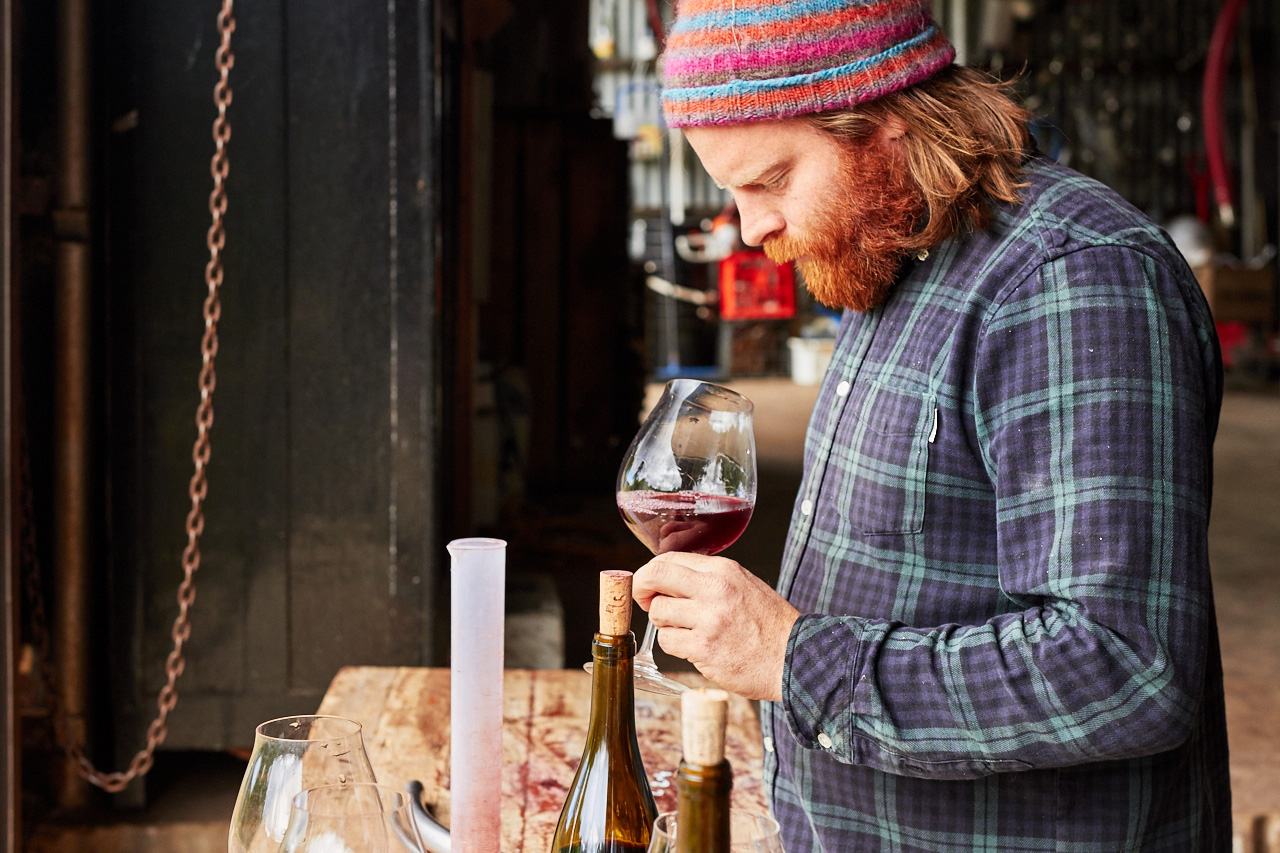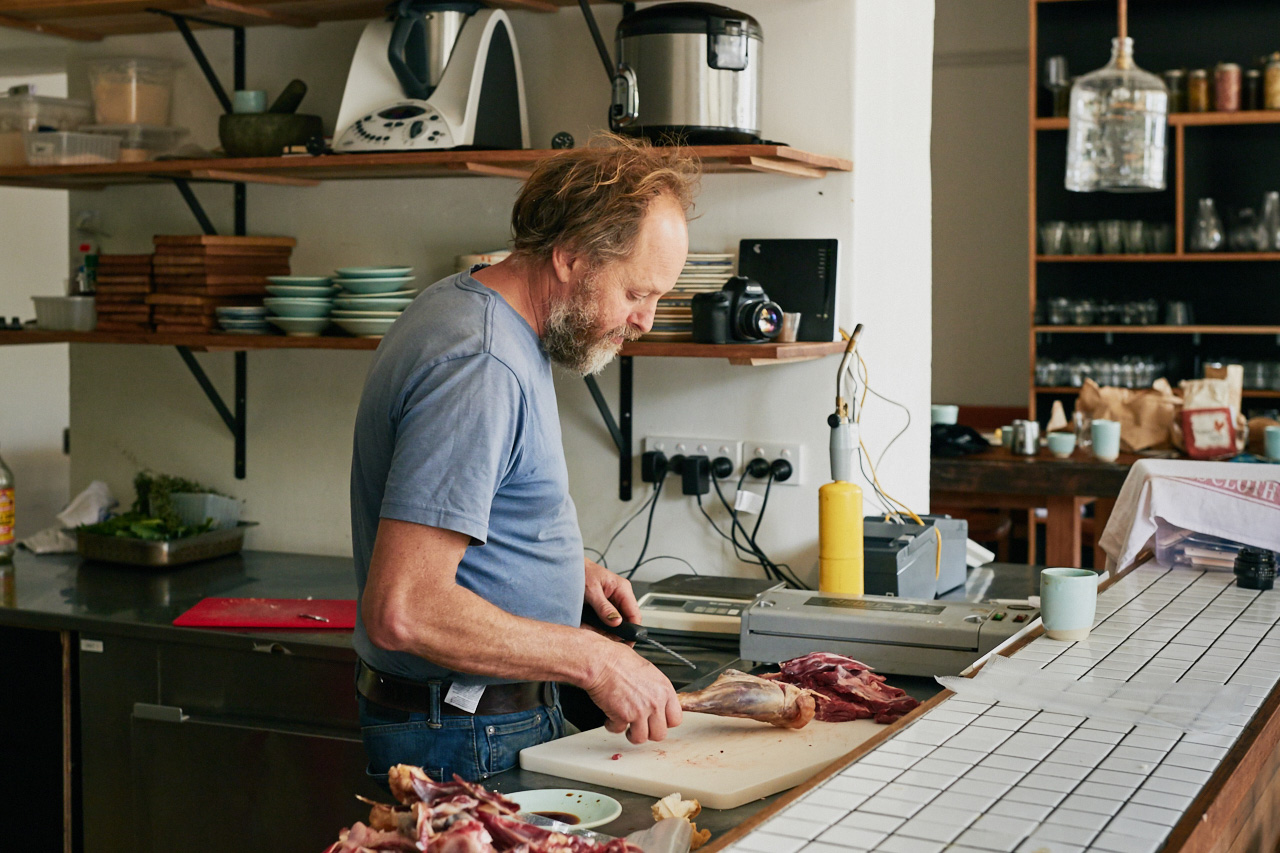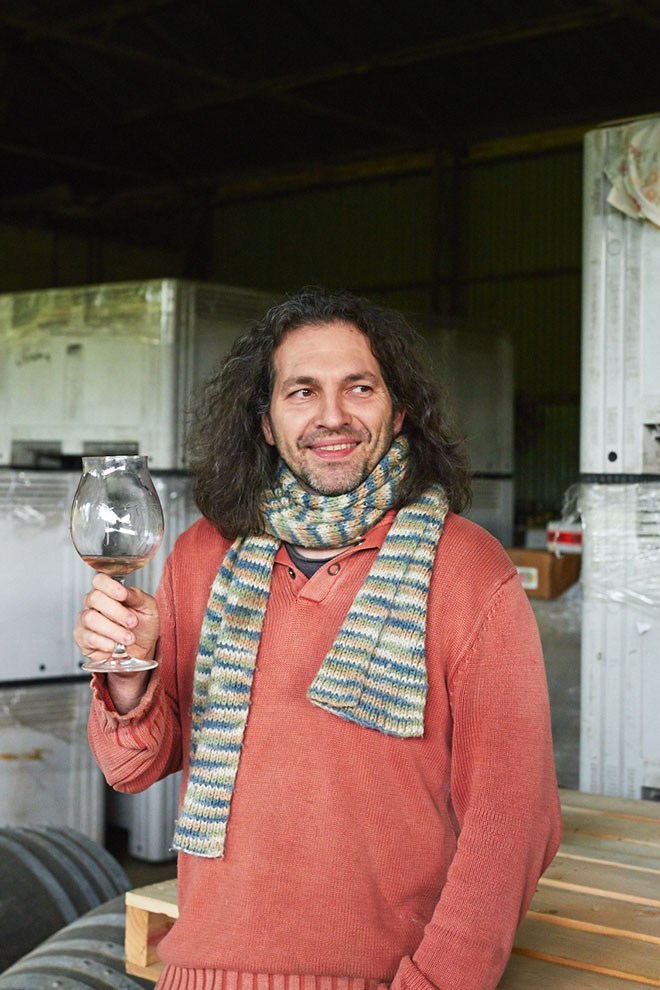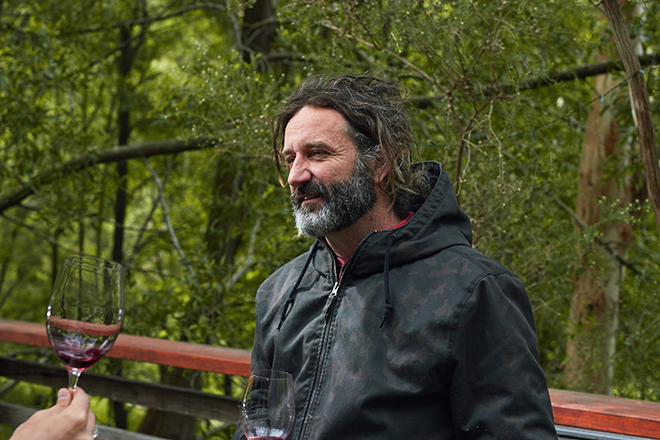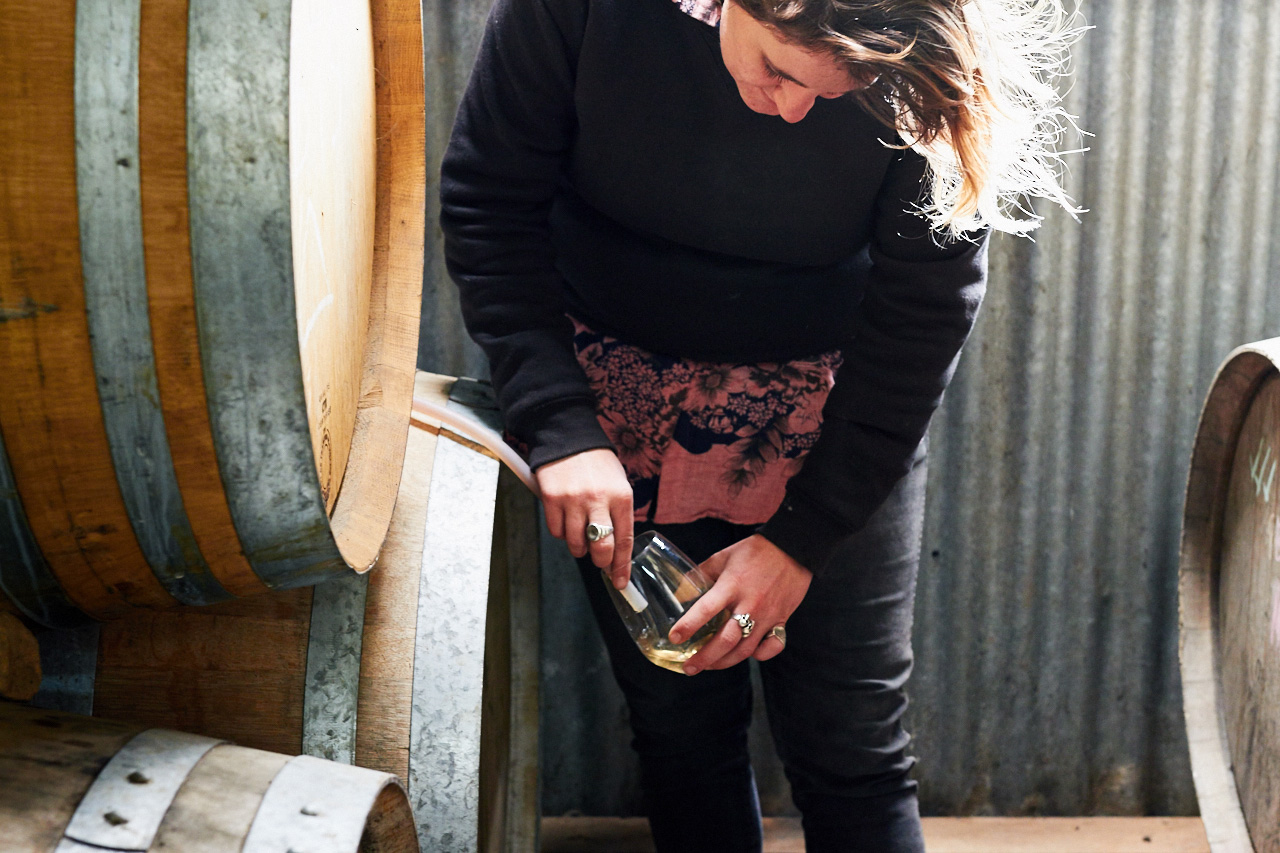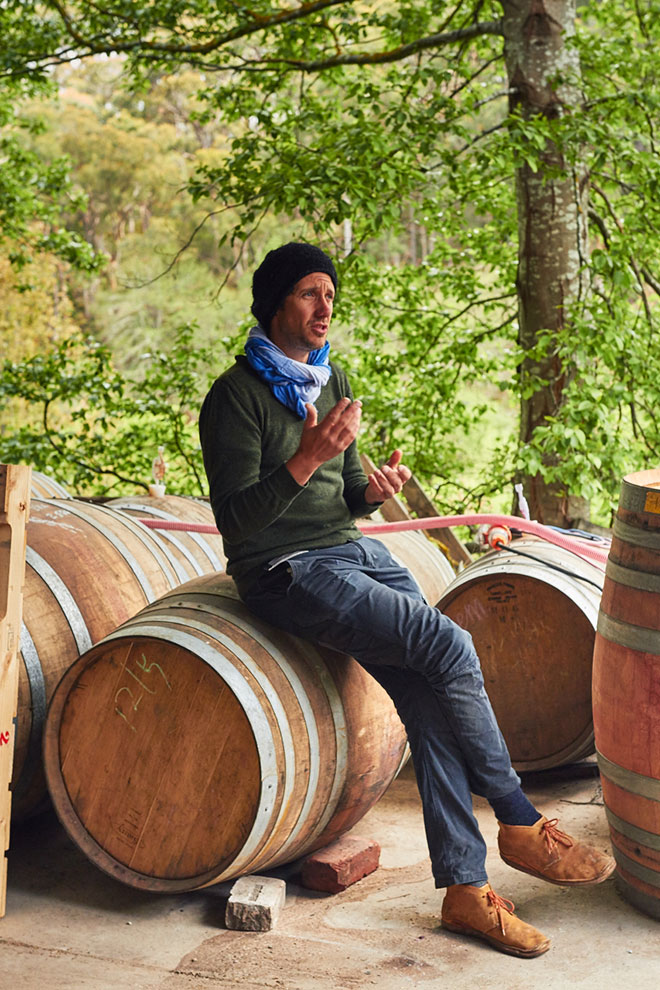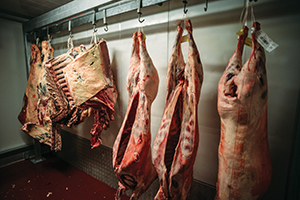There is an incredible energy to this place and its people. The charm and enthusiasm of its winemaking inhabitants is infectious, and leaves travellers who were merely passing through, or distant friends simply visiting for a weekend, quickly plotting a longer stay. This magnetism draws to mind the romantic narratives of Masanobu Fukuoka’s organic farming commune. The farmer and philosopher wrote the 1975 manifesto on a return to natural farming in Japan, and city-weary, farm-curious folk would pilgrimage to his plot in Shikoku in search of peace, understanding and a nature-bound life. Similarly, inquisitive and conscious-of-mind visitors quickly catch the Basket Range bug. And the Basket Range swiftly and affectionately absorbs these newcomers into the folds of its welcoming community. Anton van Klopper of Lucy Margaux Vineyards was one of the original renegade thinkers on the range. He took the early blows and paved the way for others to follow. He’s kind of like The Godfather of the collective. It was through Anton that James Erskine came to establish Jauma. “Anton was the original person up in the region who started to promote this culture of challenging the paradigm. You need a certain type of personality to be able to have a crack at things and stand up in front of other people and believe in yourself, and he certainly inspired me in many ways,” James says. A lauded sommelier, with a degree in soil chemistry, James had been hanging up in the hills with Anton for two years while consulting at a winery at Woodside when he realised he had all the skills he needed to give winemaking a right hard crack. “Anton was very generous and said, ‘Look, in the first year there’s going to be a hell of a lot of outlay. Why don’t you just use my equipment? Your rent can be that you can help me’. It got me off the ground basically,” James says. That openness and willingness to share knowledge and equipment was catching, with James paying this generosity forward, lending a hand to Gareth Belton of Gentle Folk Wines and Alex Schulkin of The Other Right. It’s this tutelage and support, as well as a shared belief in organic versus conventional food and farming, that saw this coterie of vanguardists decide to make wine with a light touch. “I really care about what planet we live on and what planet my children and my grandchildren are going to live on. The more we do now, the more we minimise the damage,” Alex says.
‘‘Every year we become more confident in what we do, which allows us to push the boundaries a bit further and evolve in general, while staying curious and starry-eyed.’’
Russian-born Alex met his wife Galit while living in Israel. They decided to move to Australia so Alex could chase his fledgling passion for making wine, choosing the Basket Range because the only Australian they knew, James, was based there. Alex took his background in biophysics and tacked on an honours degree in oenology from the University of Adelaide, before landing a job at the Australian Wine Research Institute, where he’s currently looking into the chemical drivers of wine texture. He came at winemaking expecting to make conventional wine. “Very little of what we plan actually turns out the way we imagined it. But I’ve realised that if things don’t work out exactly the way they were planned, it’s not necessarily a bad thing. When we came to South Australia, I really didn’t know that natural wine existed. I always wanted to make exciting wine, because that’s what I felt wine was about,” he says. But his perception of what it means for wine to be exciting has shifted over the years. While The Other Right wines appear vibrant and playful, his scientific rearing has contributed to shaping his signature style. “If you want to break the rules, or even bend them, it’s worth knowing them. In certain ways, knowing the rules can make it challenging to bend them because you know you’re going against something. But given a bit of practice, you get used to it. And that is where we find excitement now.”
Anton’s natural modus operandi is to question and break rules and systems. He too received first class honours at the University of Adelaide and made wine across various levels of convention and intervention for others in Germany, New Zealand and the United States. But he returned to the hills in 2002 and started experimenting. “I learnt so much at university and I’m so thankful for what I learnt, and I understand the concept, but it didn’t sit well with me. I couldn’t really find the answers in my study. So I went about disproving all the things that I was uncomfortable with. I didn’t really do it to prove a point; I just wanted to see what was possible. Once I started doing it, there was a little bit of backlash by some people, and a little bit of a following from others. Some that thought it was great to have freedom, and some that publicly berated what I was doing.” Anton is conscious that the holistic approach to wine and lifestyle that is a common thread amongst the Basket Range motley crew may induce a perception of hippy winemakers nesting in the hills, growing their own produce and living in accordance with nature’s rhythms. But these “crazy cats”, as Gareth dubs them, are at their core scientists and philosophers, critically questioning each other’s motivations and their liquid creations.
Taras Ochota of Ochota Barrels is also classically trained, having studied oenology and worked for vineyards both locally and globally. But he’s also the punk of the gang—and it’s impossible to have a boring time when he’s around. He’s up to his 25th vintage—the past eight have been Ochota specific—and he says he’s becoming more and more relaxed as a winemaker. “It’s basically about working with Mother Nature and dodging the bullets that she fires. But the bottom line is always remembering it’s only a drink, not to take it too seriously and relax. I don’t work very hard during vintage. I like to finish early, have a cold beer, and go for a swim in the waterhole. If it can be done tomorrow, do it tomorrow.” Taras says that his wine is a product of his own personal tastes. And because his friends and family are first-hand imbibers of Ochota wines, growing organic grapes is key. “I grow my vegetables organically, so my son can go and pick a cherry tomato and put it in his mouth without having to worry about washing it. I take the same approach with our vineyards, not putting anything nasty on them.” Each maker of the region has a deep reverence for their entire surrounding ecosystem—the soil, the people, the grapes. It’s evident that the landscape, lifestyle and life ethics of the sub-region has played a role in shaping the mindsets, philosophies, methods, and resulting new-wave wines of these makers.
‘‘Everyone lives underneath a hill, or next to a hill, or on the side of a hill. There’s not too much flat land, so all the nooks, and crannies, and the ridges, and valleys, they all occupy a little secret.’’
Brother-sister duo Jasper and Sophie Button have been making wine under the label Commune of Buttons since 2013. However, their connection to viticulture stretches back decades, with their parents instrumental in establishing Basket Range as a prominent wine region. They planted out vines in the 1990s, when the farm was owned by a commune of three families, and sold the grapes to commercial wineries to make a modest living. Now the next generation has taken the lead, converting to organic practices and co-farming the majority of the 30 acres with Anton of Lucy Margaux Vineyards.
Jasper says the Australian industry has a long way to go in understanding the importance between a vineyard’s work in cultivating grapes and the wine those grapes produce. “For whatever reason, it’s a novel concept in Australia that you can grow your own grapes and make your own wine. That’s not something that people seem to think they are capable of achieving.” He says it’s both hard work and thoroughly interesting to get to the point of understanding what a vineyard is doing and how to turn that into really delicious wine. “The world around us needs always to have evolving methods that take from the past and give to the future,” Sophie adds. “It’s within our nature to push boundaries, question techniques and enjoy the fruits of experimentation—we just happen to do that with wine. The relationship of the farmer and winemaker will always be for the individual to question. For what we do, it makes sense to take control of what we can, as there are so many uncontrolled variables.”
Anton believes that this style of winemaking requires an open and highly involved connection with the vineyard. “If you don’t have an intimate relationship with your vineyard, whether you’re buying the fruit or not, I would say that’s not natural wine. You can’t just buy organic fruit and not add anything to it. So it’s integral to the method that we make.” Jasper agrees that connection is vital in small production. “If you want to take it seriously, you have to have a hand in each of the processes.” James intentionally acknowledges his viticulturist Fiona Wood among his labelling to encourage recognition for the pivotal role growers play in shaping the final vintage. “Fiona is integral. It’s her energy and ideology that goes into the farming. For me, that’s what creates a very unique starting point. There’s simply just no recognition in Australia for growers,” he says.
This highly attentive, hands-on practice validates that minimal intervention doesn’t mean minimal involvement. This progressive cohort are not championing minimal intervention wine because they don’t want to be involved. Rather, it’s the opposite. They’re creating challenges for themselves that any sensible winemaker wouldn’t create for themselves. This approach is also demonstrative of how far we’ve diverged from ancient winemaking. Somewhere along the line we thought we needed to make artificial additions at both the viticulture and vinification stages to control the end product. “When we started out, the idea of not adding acid was huge; the idea of not adding sulfur was impossible; the idea of selling wine to the French was crazy. The paradigm has been smashed,” James says. It’s an anxiety-inducing experiment, where precision is applied to picking time, while ferments are left to nature’s chosen direction and a little bit of oxygen can dramatically alter a wine’s intended course. “You can control the growing to an extent, but when you’re making wine without additions, you’ve just got to guide it along. You can’t control it sometimes,” Gareth explains.
Gareth came to winemaking in 2012, making one barrel that became three the following vintage and then dozens the successive years. He previously worked as a research scientist in marine biology focusing on seaweed diversity. Now he farms his own grapes and makes the wine, with wife Rainbo and brother-in-law Kyatt. “I think I am becoming better at being able to let go and feel the wines and let them lead me,” Gareth muses. “This is becoming increasingly important on a personal level, rather than trying to harness or control something into something it’s not—or what people expect wine to taste like from my region or variety.”
James says that many winemakers are control freaks, but in the natural wine game, wine is just a small part of a greater philosophy. “We’ve had to ask a lot of questions about the processes that we do to get the results we get with our wine, and we all have an individual expression that can’t be replicated. It’s about learning to let go, and understanding that as much as you wish to control wine or life, you can’t. This has come from a history where we’re all taught to plan for the future, and we’ve had to unlearn that and just accept.”
These creative, fringe thinkers have somehow been drawn to this sub-region and this style of winemaking, and managed to assemble a cohesive cluster. They’re all individually aiming for a harmonious existence in how they live on the land they occupy and with the people surrounding them. But it’s not all chill commune vibes either. “It’s a very interesting community because there are a lot of strong personalities. There’s the potential for conflict, but we’ve all surmounted that very openly,” James admits. There’s a greater ethos that unites them. They keep each other on their toes as to not fall complacent. But they also rely on each other for emotional and physical support, reassurance that they’re doing a good thing, that what they’re tasting is good and true, and a little help back-handing those doubts and anxieties away. Gareth says the high concentration of makers in the Basket Range makes a huge difference. “We’re pretty critical of each other, but in a good way. We push each other a lot. Without each other, maybe none of this would have been possible. Winemaking and farming equipment is very expensive, so being able to lend is awesome. Also, being able to ask a range of people for winemaking advice is just as important. Though having friends next door, with open doors, is probably the most important.”
The interaction between this Basket Range outfit is almost like an incubator for a greater reconciled community on a national and global scale. “Because it’s becoming more and more diverse, I think one of the biggest challenges for Australia is people getting on together and drinking together. And they don’t need to drink the same wine or have the same political or social beliefs, but it’s quite nice to just say, ‘We don’t agree on anything, but I can still drink and eat with you. It’ll make the world a more pleasant place’. Maybe that’s what makes our region a little more advanced, that we’re always getting along and finding a way to work through differences—which are quite large because we’re all emotionally involved in what we do,” Anton reflects.
In this mode of being and making, where nothing is secure, risk is high, and uncertainty is a constant, these utopian thinkers and dreamers are pushing the boundaries of winemaking, and life, as it currently stands, into unimaginable futures. “None of us are really making wine for the market,” Gareth says, “We’re just doing what we believe in, and we’ll spend our whole lives doing it.”
